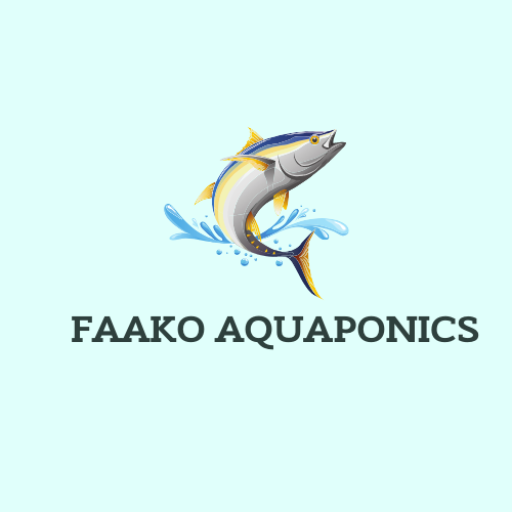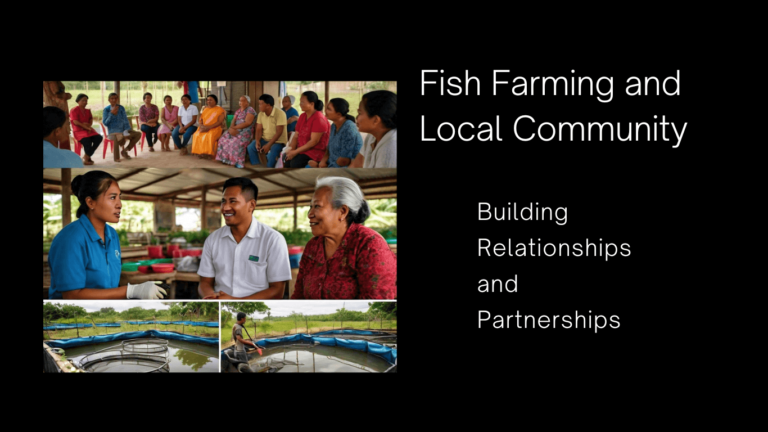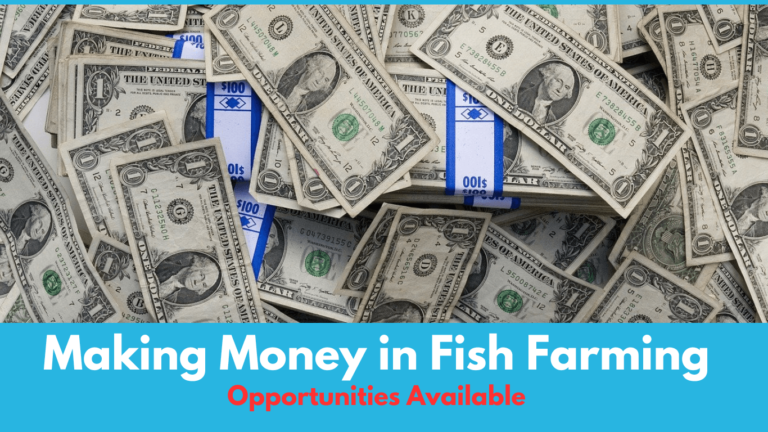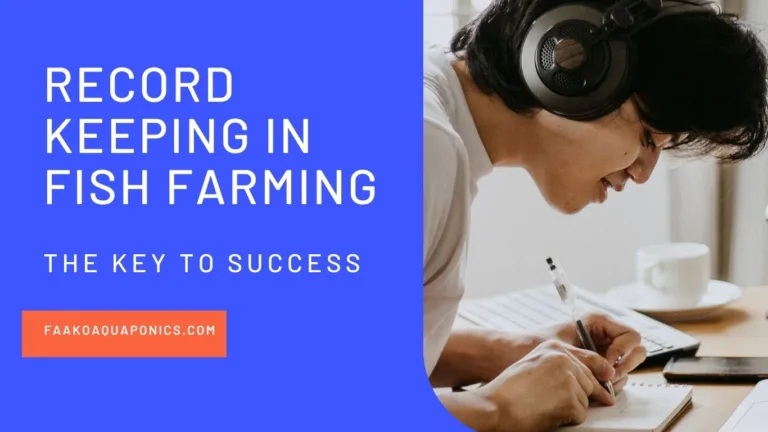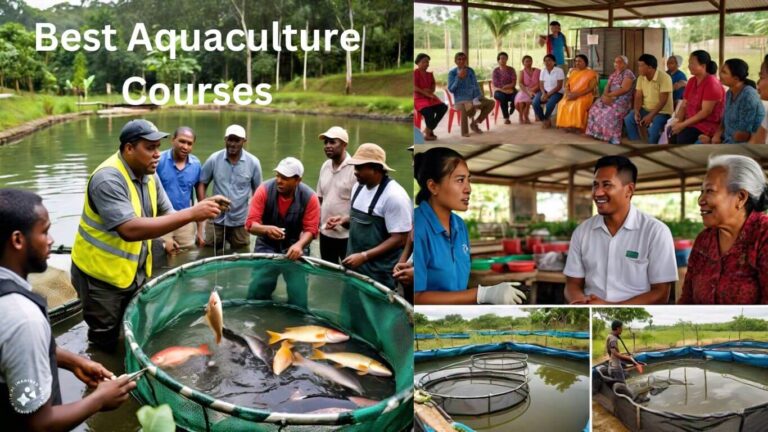Fish farming and community are two separate things but work together since fish farming cannot exist without the community but the community can exist alone. To a large extent, a community can exist without fish farming but fish farming cannot exist without a community. This is because fish farming takes place within a community.
In effect, there ought to be relationships and partnerships between the two to ensure the utmost success. Because each one benefits from the other.
Fish farming, also known as aquaculture, has become an essential component of the global food system, providing a significant source of protein for millions of people around the world. However, the growth of the industry also raises concerns about its impact on local communities and the environment.
In this article, we shall explore the importance of building relationships and partnerships between fish farmers and local communities. And how this can lead to mutual benefits and a more sustainable future.
The Importance of Community Engagement
Fish farming operations traditionally used to take place in coastal areas. But due to the advancement of technology, it takes place almost everywhere. But it can have a significant impact on local ecosystems and communities. If not managed properly, fish farming can lead to environmental degradation, displacement of local people, and loss of traditional livelihoods.
However, with proper community engagement and partnership, fish farming can also bring numerous benefits to local communities, such as:
1. Job Creation and Economic Growth
Fish farming operations can create employment opportunities for local communities, both directly and indirectly.
Direct employment includes jobs in fish farming, processing, and marketing. Indirect employment includes jobs in supporting industries such as feed supply, equipment maintenance, and transportation.
My fish farm offers a variety of jobs for the local community members both permanent and temporary. The permanent are the guys who take care of the day-to-day activities. But the temporary guys are engaged during harvesting, smoking, and any other time that we need more hands on the farm.
By engaging with local communities, fish farmers can ensure that local people benefit from these employment opportunities, leading to increased economic growth and development. That is how fish farming and the local community benefit from each other.
2. Improved Food Security and Nutrition
Fish farming can provide a reliable source of protein-rich food for local communities, improving food security and nutrition.
By engaging with local communities, fish farmers can ensure that their products are tailored to meet local needs and preferences and that local people have access to fresh, nutritious fish.
This is especially important in areas where access to nutritious food is limited, and fish farming can play a critical role in improving public health.
Fish farmers produce fish for the local community members as nutrition and as need the community as a market. So both fish farming and the local community solve their individual needs.
3. Enhanced Environmental Stewardship
Fish farming activities can have environmental impacts, such as water pollution and habitat destruction, if not managed properly.
By engaging with local communities, fish farmers can ensure that their operations are environmentally sustainable and responsible.
Local communities can provide valuable insights into local ecosystems and help fish farmers develop strategies to minimize their environmental footprint.
This can include measures such as sustainable feed sourcing, waste management, and habitat conservation.
4. Preservation of Traditional Knowledge and Culture
Fish farming can also impact local cultures and traditional ways of life, particularly in coastal communities where fishing and aquaculture have been practiced for generations.
By engaging with local communities, fish farmers can ensure that their operations respect and preserve traditional knowledge and cultural practices. This can include measures such as supporting local fishing traditions, preserving cultural heritage sites, and promoting cultural exchange programs.
By doing so, fish farmers can help preserve the rich cultural diversity of local communities and promote a more inclusive and sustainable food system.
Both Fish farming and local community have roles to play in preserving traditional knowledge and culture.
Building Relationships
Building relationships between fish farming and local communities requires effort and commitment from both parties. Here are some ways to foster positive relationships:
– Open Communication: Regular meetings and open communication channels can help build trust and understanding between fish farmers and local communities.
When there is no clear communication, a lot of things are likely to go wrong. This is because fish farmers will not be able to communicate their challenges to the local community people and vice versa.
– Collaborative Planning: Involve local communities in the planning and decision-making process to ensure that their concerns and needs are addressed.
To ensure fish farming and local community are both successful, each side needs to be open for collaboration, and that will enhance development.
– Education and Training: Provide education and training programs for local communities to enhance their understanding of fish farming and its benefits.
This is very important especially for the fish farmer to always educate the local community members about the operations. This is to avoid doubts about unnecessary negative attributions which might not be the case. And to always clear all misconceptions.
The fish farmer should also be open to learning from the community members. Is a win-win game for both fish farmers and local community members.
– Community Development Projects: Support community development projects that promote economic growth, education, and environmental conservation.
As a fish farmer, you also have contributions to the development of the community in which you operate. That is what we call social return. This could be cash or kind but make sure you have marks in the community.
Partnership Models
Several partnership models can be adopted to promote collaboration between fish farmers and local communities. Some of these models include:
– Joint Ventures: Fish farmers and local communities can form joint ventures to manage fish farming operations and share profits.
– Community-Based Fisheries Management: Local communities can take ownership of fish farming operations and manage them sustainably.
– Fish Farming Cooperatives: Fish farmers can form cooperatives to pool resources, share knowledge, and market their products collectively.
Case Studies
The relationship and partnership between fish farming and local community is overwhelming and I want to share a personal experience.
In the community where my fish farm is situated, I can say it is very collaborative so far. Perhaps, I’m also collaborative.
I used to dump dead fish in a nearby bush around the farm thinking it has no effect on the local community members. I was perhaps thinking that the dead fish would serve as food for cats and other animals.
So each time I found dead fish in the pond, I simply threw them into that empty bush plot until one morning. On that faithful morning, I came to the farm and one of the community members approached me. He told me about how the smell of the dead fish disturbs them.
He told me they had heard a bad smell the day before and was wondering what could be that. It continued till they sent some boys to find out in the bush and they later came out with the news of the dead fish they found. So they asked the guys to bury them.
The community member recommended to me to always bury them. I thanked him so much and since then I never dumped them like that. I always bury them. So that is how fish farming and local community should work collaboratively and open communication.
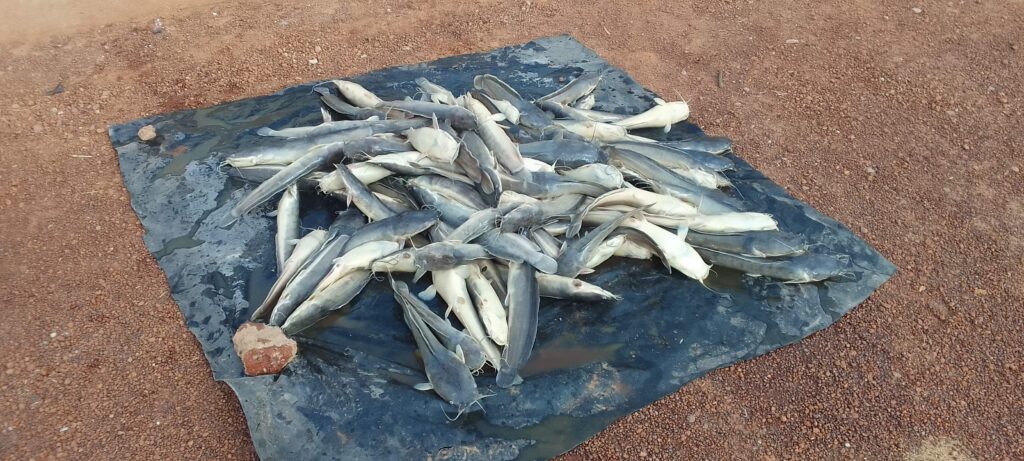
dead fish should be disposed responsibly
Conclusion
Fish farming and local community partnerships are crucial for building a sustainable and equitable food system. By engaging with local communities and building relationships, fish farmers can ensure that their operations are socially and environmentally responsible.
In return, local communities can benefit from job creation, economic growth, and improved food security. “The right hand washes the left hand and the left hand washes the right hand”
Let’s work together to build a brighter future for fish farming and local community development.
Call to Action
If you’re a fish farmer or a member of a local community, we encourage you to take the first step in building a partnership today.
Reach out to your local community or fish farming operation and start a conversation. Together, we can make a difference and create a more sustainable future for generations to come.
